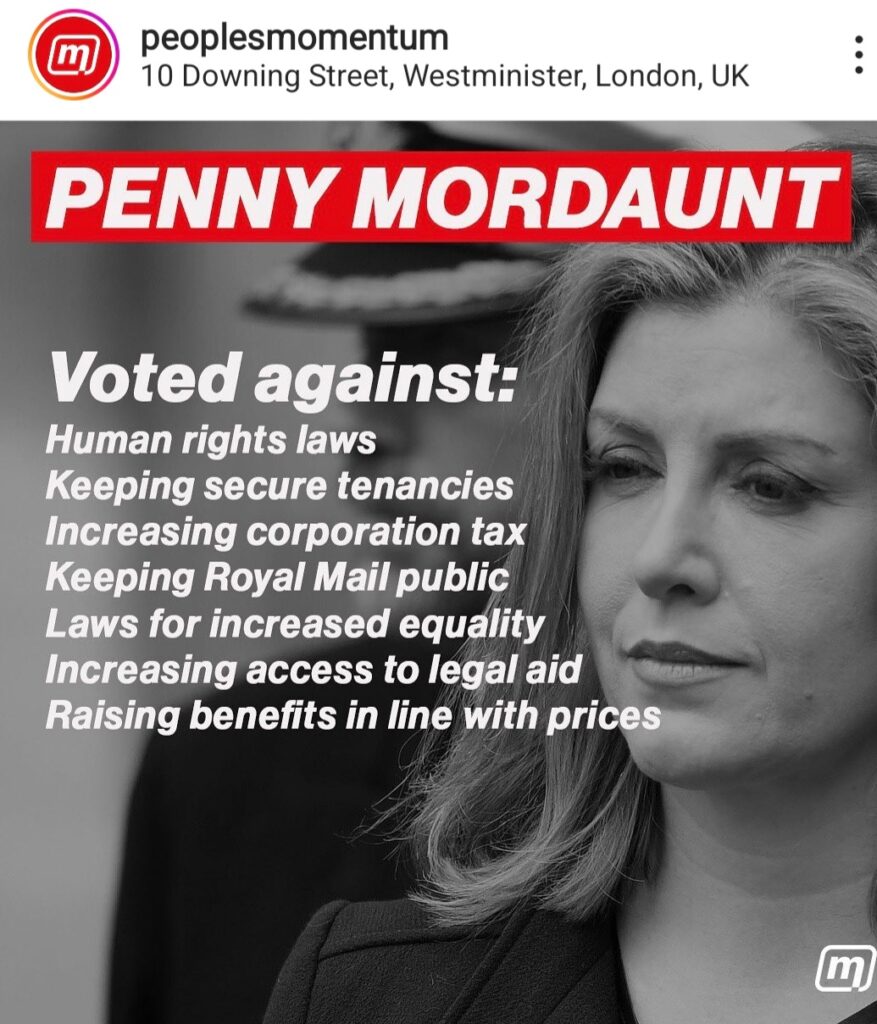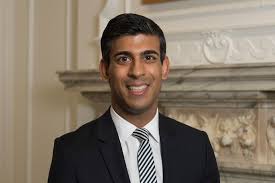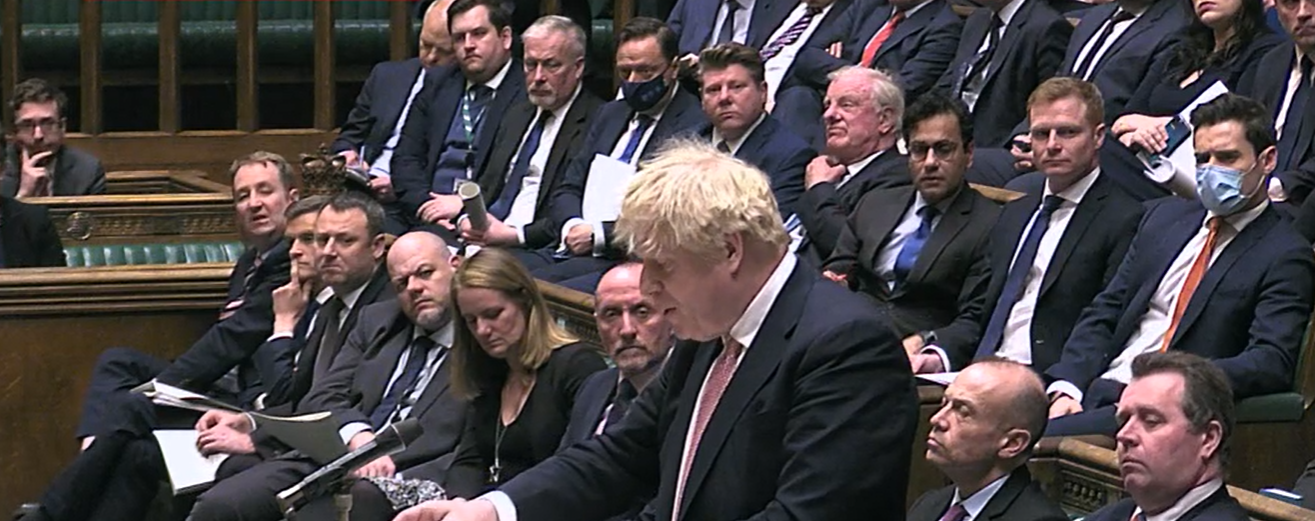It is difficult to imagine a group of people less representative of the majority of the UK population than the membership of the Conservative Party. Yet this narrow selection, comprising less than a quarter of a million, are about to elect a leader and a Prime Minister, who will see it as their job to get ‘get austerity done’ and batten down on the living standards of the other sixty million.
In 2017, the Bow Group, a part of the Conservative Party, put the average age of members at 72 years, although other estimates put it at just under 60. Whatever the age, the Tory Party is overwhelmingly white, middle class and relatively well-to-do. It is a party that harbours thousands of doorstep racists and misogynists, keeping a low public profile for the most part, but who vote against one or more of the candidates on offer based on their sex or skin colour. We should not underestimate the capacity of thousands of Tories to vote specifically to prevent a brown-skinned man being Prime Minister.
The Tory Party membership will be balloting up to the first week of September, to choose between two candidates selected by MPs, but as this article is published, it is not clear who the final two will be. The bookies are looking at a straight fight between Rishi Sunak and Penny Mordaunt, or as a less likely possibility, Sunak and Liz Truss. One thing is certain, however: whoever wins will be hell-bent on squeezing the living standards of working-class people.
Every single one of those who put themselves forward for leadership has supported all the reactionary measure put forward by Boris Johnson. As Johnson leaves stage right, off to re-write history, burnish his imaginary ‘legacy’ and make millions from books and speeches, his successor, now centre stage, will be someone who has enabled the most lying and corrupt prime minister in modern British history.
All of the candidates supported Johnson’s reactionary policies
Every one of the candidates supported parliament bills to restrict democratic freedoms, to challenge the citizenship of millions (overwhelmingly brown-skinned) who have lived in the UK for decades and to cut taxes for the rich. During the first months of the Covid pandemic, all of them supported the corrupt ‘fast-tracking’ of contracts for the friends, associates and donors to the Tory Party. They supported the lies that hid the partying in Downing Street for months and the lying that led to the temporary (and ‘illegal’) prorogation of Parliament in 2020.

Rishi Sunak has expressed a wish, should he become leader, to govern ‘like Margaret Thatcher’, which might appeal to some Conservative Party members, but will send a shiver down the spine of millions more who remember her destruction of British industry and give-away privatisations. The only claim to fame of Penny Mordaunt, popular among Tory members – a YouGov poll makes her favourite – is precisely that she is not so well known and was not seen as one of the main standard-bearers for Johnson. Yet she loyally supported every policy he put forward.
The fight for the leadership has the Tory parliamentary party tearing itself apart and that is a welcome spectacle for Labour members. Rishi Sunak has been denounced by Jacob Rees-Mogg, that standard-bearer of eighteenth-century economic values, as a ‘socialist’. His opponents have accused him of ‘betraying’ Johnson, a narrative supported by the Daily Mail, a rag well-loved by Tory Party members.
Tories tearing at each other now, but they will close ranks
Meanwhile, according to the parliamentary correspondent of the Financial Times, supporters of Sunak just roll their eyes at Penny Mordaunt’s economic naivety and lack of depth. “This is no time for an amateur”, one of them said. We can be sure, however, as soon as the contest is over on September 5, that Tory MPs will close ranks around whoever is chosen.
It is not quite true to say that the new Tory leader will be ‘continuity’ candidate, because the economic outlook, if anything, is getting progressively worse. There will be pressure from the Bank of England, big business and the media to implement further cuts in public spending – meaning cuts in jobs and services used by working class people – and to stand fast against any workers trying to hold the line on living standards.
Whoever wins the Tory leadership contest will be in charge of an economy that is going down the pan, and fast. Earlier this month, the Bank of England issued a stark warning on the economic outlook for the world economy and the UK economy in particular.
“Since the last financial stability report, the global economic outlook has deteriorated markedly,” said Andrew Bailey, the BoE’s governor. The Bank is insisting on ‘stress tests’ for secondary banks, to ensure that they can weather the coming economic storm, including planning for “deep simultaneous recession in the UK and global economies, real income shocks, large falls in asset prices and higher global interest rates”.
“We are heading for a shit storm”
As we have argued in another article, the British capitalist economy is stagnant and in terminal decline in comparison to other G7 countries and, as one cabinet minister told the Financial Times: “We’re heading for a shit storm — we’d better choose someone who knows what they are doing.”

But that storm will hit the Labour Party leadership as well and a key question for Labour Party members is what effect a new Tory leadership will have on the Labour Party’s fortunes. We might understand that any new leader is polluted by the poison of the Johnson government, but that may not be the view of many ordinary voters. Whoever is the new Prime Minister, he/she will be presented in the media as a shiny, new leader. Tax cuts will be promised and much else besides. The Sun, Mail, Express, Telegraph et al will rally behind the new leader, as will the grovelling BBC news and current affairs.
Without the obvious blustering and lying of Johnson, a new Tory leader puts Keir Starmer into something of a bind. It was Johnson’s good luck that the most rotten government in modern times was faced with the weakest opposition in modern times. Starmer’s only visible policy is ‘not being Corbyn’. He has spent all of his energy and enthusiasm – meagre as it is – attacking the left of his own party, while pushing policy far to the right.
Starmer’s election was fraudulent; he only won the leadership on the basis of his ‘Ten Pledges’, which he promptly dumped. He has ditched all the radical elements of the 2019 election manifesto, even those parts that opinion polls show to be popular.
Faced with a choice between a grey, uncharismatic and charmless leader with no policies, voters might well prefer a sparkling new leader who at least appears to have some. Why vote Tory-lite, when the real Tory Party has a new livery?
It would not be a surprise at all if Labour, after having crawled painfully ahead in the opinion polls, begins once again to lag behind the Tories. When that happens, Labour members should be demanding that they, too, have a new leadership contest and at the very least a return to the radicalism of the 2019 manifesto.



